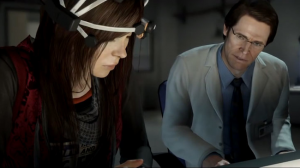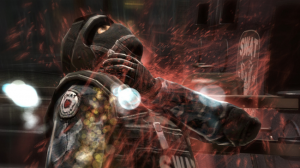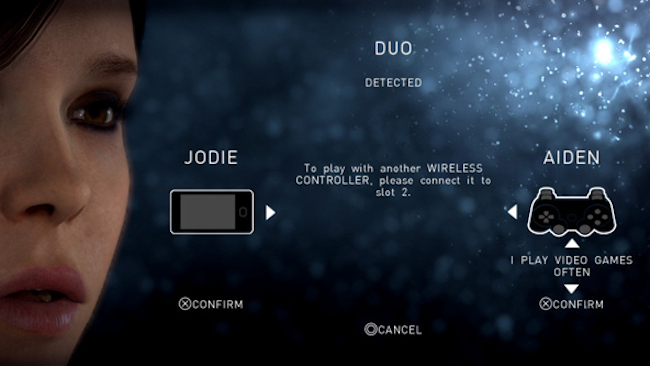
Beyond: Two Souls is the latest emotional rollercoaster from the creative mind of David Cage and his talented team at Quantic Dream. Prior to this games release, the studio had become well known for other titles such as Fahrenheit and Heavy Rain, but equally as much for their ability to divide the industry on what the definition of a game is. I don’t know if it’s just me, but it certainly appears that narrative driven games are becoming a bit of a controversy as we’ve hit the end of the current generation, and to be honest; I don’t really understand why? If anything, this extended generation has suffered from sequel syndrome more than any other, and so it baffles me why the concept of a game that is trying to do something different would be such a problem for so many people. I’m not saying these games aren’t without technical shortcomings, but I also feel they’re judged a little unfairly.

There are some people out there who believe David Cage should abandon the industry to make films, but I am not one of them. In fact, I strongly advocate for any game that doesn’t rely on violent and competitive gameplay mechanics in order to be successful; it is also the reason why I appreciate what Quantic Dream is trying to do with Beyond: Two Souls. Recently, it would appear that this “narrative” trend is being driven solely by indie developers with titles such as The Walking Dead, Gone Home, Dear Ester and To The Moon, and unsurprisingly, none of these mentioned games include a lot of conventional gameplay. It’s true that these titles have all received their fair share of “game defining” criticism, but at the same time, I can’t help but notice all the review commentary that praises each of these indie developers for trying to think outside the box. And so, I have to ask, regardless of how well Cage’s ideas come together this time; does this particular game really deserve so much negative attention?
The narrative for Beyond: Two Souls is straightforward in the sense that it chronicles the first 23 years of Jodie Holmes’ life, as well as her relationship with a supernatural entity known as Aiden. However, what this game does differently is that it does not play out in any chronological order. Instead, the story is explored from a totally non-linear perspective by jumping between different moments of Jodie’s life. It might sound confusing, but the loading screen provides a timeline that expands as you move forward to help put everything into perspective. It’s evident that this approach was chosen in order to develop our emotional attachment to the characters whilst still maintaining a consistent sense of mystery. The consequence for this approach is that it limits the impact of the players choices, and this was concerning given the success in Heavy Rain’s design. And yet, when I reflect on Beyond’s narrative as a whole, I don’t think it would have worked as well had it been more like it’s predecessor.
With that being said, the game still adequately delivers the illusion of choice, and whilst this won’t provide the same replayability as a branching narrative; it will certainly engage with the players emotions during that initial playthrough. Honestly, my only major concerns were the supernatural themes given what had happened to the end of Fahrenheit, and so I have to admit that I went in with somewhat lowered expectations. And yet, with every chapter I found myself more enthralled with the story and heavily invested in the lives of each character. In fact, the narrative consistently impressed me with how comfortably it could shift between so many different genres. Science Fiction, Horror, Action, Drama; it covered so much and still managed to succeed relatively well with each approach. Admittedly, there was still a bit of cheesy dialogue, but I also think this is Cage’s best writing to date. It was a genuinely moving story, and whilst it might not be for everyone; it’s an experience that I won’t forget quickly.

Given that each Quantic Dream game typically elaborates on the design of it’s predecessor, I don’t think it was an unreasonable expectation to anticipate an evolution from the approach that was used in Heavy Rain. It’s true that there has been a fair amount of criticism for the regular use of Quick Time Events in Cage’s previous games, and whilst it’s good to see this feedback was taken on board, I am disappointed to see that it has led to a much simpler design in many regards. To explain, the amount of things you can interact with has been significantly reduced, and the interactive events don’t really pose much of a challenge. In fact, you could probably put the controller down and still get a similar end result, and this is going to be a major turn off for those people who were more invested in the gameplay dynamics of the previous game. It’s not necessarily bad design, but a lot of your time with Jodie is going to be comprised of looking for points of interest that are represented by white dots.

Fortunately, this is somewhat redeemed by the inclusion of Aiden; a supernatural entity whom the player can switch between and control freely using a first person perspective. Unfortunately, It’s still a matter of looking for white dots to interact with in a lot of cases, but it does at least provide some sense of empowerment to the player by removing the feeling of being restricted. However, I still can’t help but take issue with the fact that despite having a strong arsenal of abilities on hand, the game selectively chooses when Aiden can use his powers, and without any apparent logic to justify why. In my opinion, this negated a fantastic opportunity to introduce puzzle solving into the experience, and honestly, I think such an approach could have significantly helped to alleviate the games tendency to rely too heavily on narrative, and step “beyond” to appeal to a much larger audience – Pun intended.
The interesting thing about the gameplay in Beyond: Two Souls is that it’s “technically” better than Heavy Rain. No longer are players forced to fight against awkward control schemes that use R2 to move forward, and it is also worth noting that the gameplay extends to scenarios such as riding motorbikes and engaging in modern combat; in a much more player-controlled manner as well. It’s still a far cry from being as great as the genres it imitates, but it’s definitely a step forward for the gameplay; despite there technically being less of it as weird as that may sound. With that being said, less isn’t always more, and hearing this is definitely going to be a turn off for some players. This is the reason why I felt utilising Aiden, who is much more dynamic in the way he’s controlled, could have fleshed out the gameplay experience, but it still works well for what it is. The only problem I had with the gameplay was judging the direction I had to push the analog stick when the action slowed down, as the on-screen indicators were clearly removed to shake the QTE criticism. Honestly, it just didn’t function very well, and it would have been better if they didn’t try to disguise what it was. Although, it’s worth clarifying that the game can actually be played by two people, one controlling Jodie and the other Aiden. This is especially useful if you have a friend or partner who doesn’t often play games as it also allows the option to take control using touch on a smart device.

If there is one thing that Quantic Dream excels at more than anything else, it’s graphics. Often being the front runner for new technical demonstrations and portraying the potential of PlayStation hardware, they really know how to pull out all the tricks. If we were to compare Beyond: Two Souls to Heavy Rain, which was also running on the PS3, I can confidently state that it looks better in absolutely every regard. In fact, some aspects of the game look so great that it actually draws unnecessary attention to the very few areas of the visual presentation which aren’t always consistent. If anything, the faces are what make the game shine, and having thought that L.A Noire was the best we were going to get out of this generation, Beyond really smashed those pre-conceptions. Does limiting gameplay mechanics allow for additional technical resources? Whatever the reason, it looks incredible.
Another element within the presentation that worked really well was the extensive colour palette, and the many locations the game took place. Whether the player was infiltrating a military installation out in a snowy wasteland or aimlessly wandering a long desert road, David Cage could take us as far as his imagination could reach. However, with all that being said, I think I still have to hand a lot of the credit to the incredible performances from both Ellen Page and Willem Dafoe. To be honest, I have to admit that it was kind of refreshing to ditch all of the French-American accents that tarnished the performances in Heavy Rain, and cliche or not, get some serious talent behind the project. It was also great being able to see digital makeup carry these characters across so many years, and without a doubt, introduce some of the best personalities that Quantic Dream have created yet.
 Unique and captivating narrative structure
Unique and captivating narrative structure Top performances from “Grade-A” talent
Top performances from “Grade-A” talent Great variety in location and presentation
Great variety in location and presentation Multiplayer options are a nice touch
Multiplayer options are a nice touch Aiden alleviates the overbearing restrictions
Aiden alleviates the overbearing restrictions
 Player consequences are only marginal
Player consequences are only marginal Backward design limits gameplay potential
Backward design limits gameplay potential There is almost no difficulty whatsoever
There is almost no difficulty whatsoever Missed opportunities for puzzle solving
Missed opportunities for puzzle solving This game will simply not be for everyone
This game will simply not be for everyone
Beyond: Two Souls succeeds as a narrative experience and confidently delivers a captivating story that is thoughtful and driven by interesting characters. The non-linear structure is an intriguing idea that works fairly well despite limiting the players ability to make meaningful choices, but overall, I think David Cage and his team at Quantic Dream mostly achieved what they set out to do in the beginning. However, the problem is that this game will simply not be for everyone as it really depends on how anal you are with your definition of a game. Honestly, it’s great, but if you’re not going into it for the story, you may just end up having a miserable time trying to take what visual enjoyment you can from seeing lots of Ellen Page. In my opinion, it does enough to justify being called a game, but unlike some of the aforementioned titles in this genre, I’m not entirely convinced it needed to be one.











